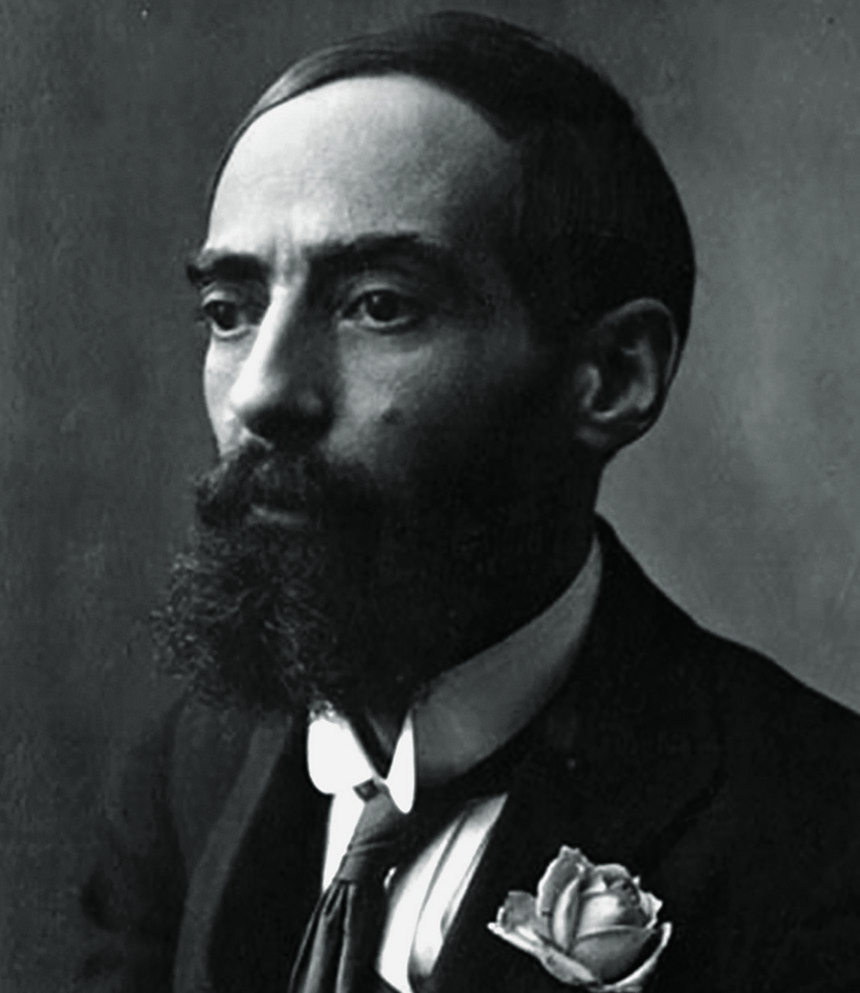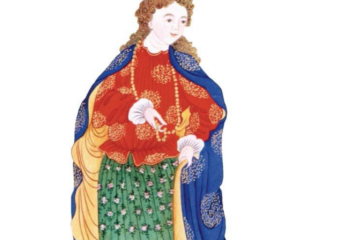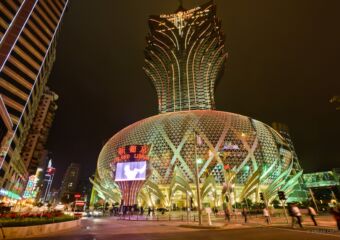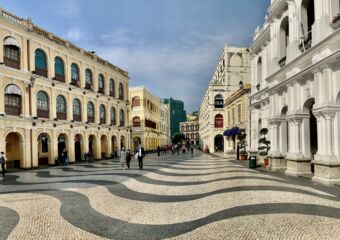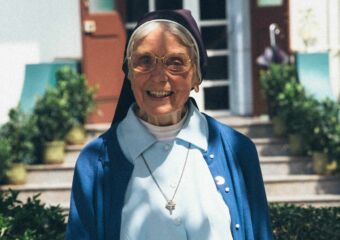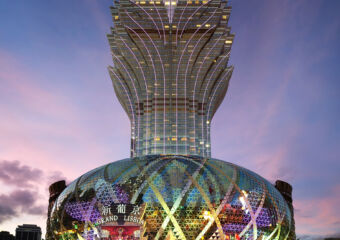Born in the Portuguese city of Coimbra on September 7, 1867, Camilo Pessanha probably loved his school years’ bohemian life as much as literature, but Macau was what really caught his heart for good. After graduating in law and practicing in a small Portuguese town, Pessanha departed to Macau on the Spanish vessel, Santo Domingo (February 1884) after earning a spot as a philosophy teacher at the then newly inaugurated Liceu de Macau (high school). Heartbreak was one of the main reasons for him to apply for a job in Macau after Ana de Castro Osório refused his marriage proposal.
Although he only published one book, the writer has a longstanding list of published and recited poems over the years since a young age. In Macau, he found a fostering ground for his poetry writing, a close set of friends, but also opium and women. In a way, the Portuguese poet is said to have generated a new Macanese family, bringing the Pessanha surname into the region. Read all about the author of Clepsydra who arrived in Macau on April 10, 1884, and the great grandfather of a local Macau woman.
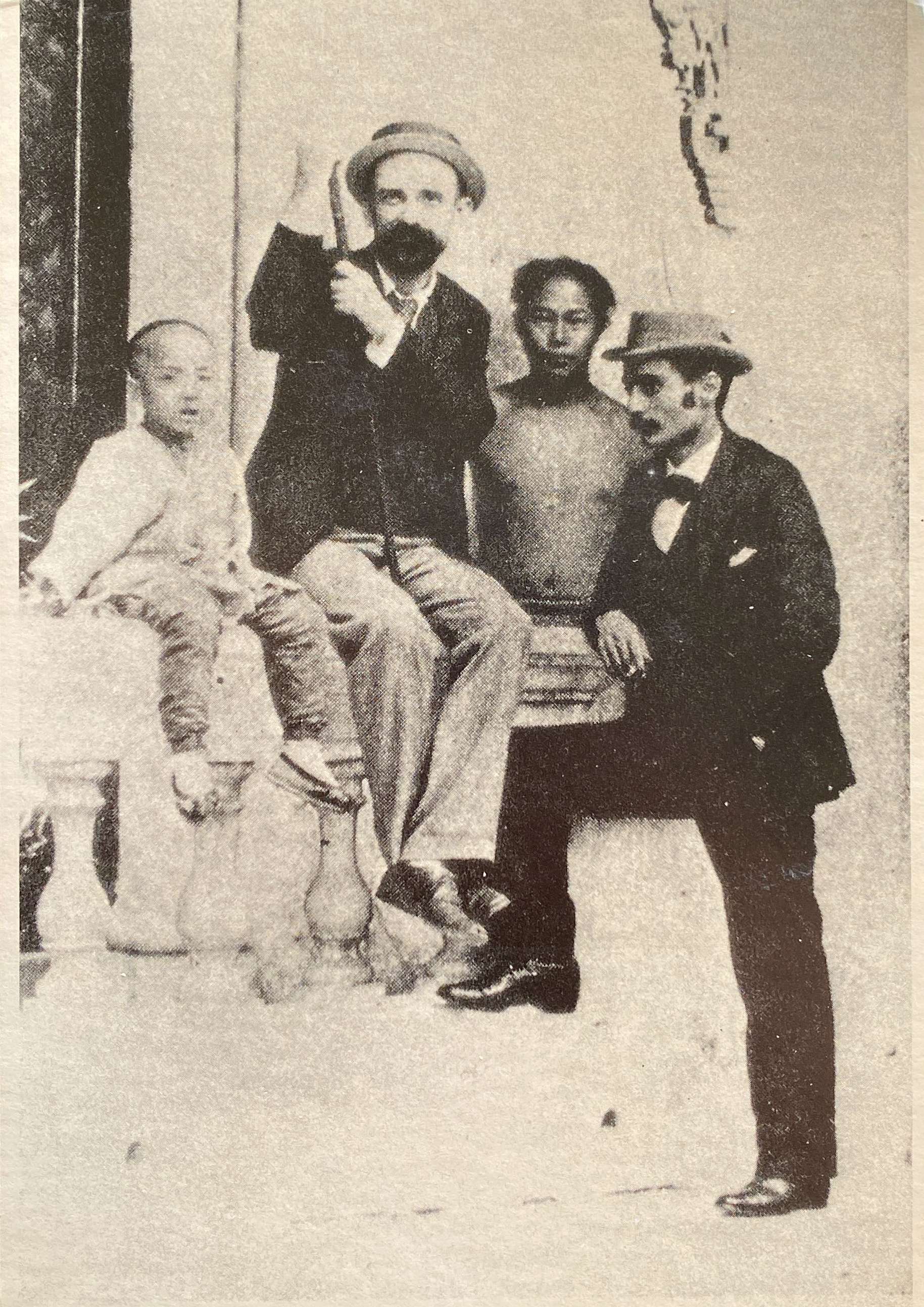
Camilo Pessanha and Vesceslau de Morais in Hong Kong (circa 1895). Source: Instituto Português do Oriente, Macau (1990)
Camilo Pessanha: The Portuguese Bohemian Ways
Born in the 19th century, Camilo Pessanha had been writing since he was 18, publishing some of his poetry throughout the years in Portuguese newspapers. His time was particularly prolific on art–especially painting–and literature movements, where artists would gather and discuss creative processes and their own works with friends and peers. There were social gatherings where groups of artists talked about politics, society, called “tertúlias” in Portuguese. Main meeting points would be known cafés or the homes of these artists. Pessanha never wrote his poems down: he’d recite them by memory to the audience. Clepsydra is the only book ever published under his name with the help of his cousin António Osório de Castro.
The son of law student António de Almeida Pessanha, and Maria do Espírito Santo Pereira–a maid at his house–the writer’s works are brimming with personal emotions and life experiences, including that of being the result of an “illegitimate” relation. Camilo was part of the Symbolism era, an artistic movement born in France, very popular during the 19th century that heavily influenced a series of painters, writers, poets, and thinkers. Artworks from the Symbolism movement were usually subtle expressions of individual emotions in the form of highly symbolized elements. This movement affected literature and fine arts in general, mainly painting. Frenchmen Stéphane Mallarmé, Paul Verlaine, Arthur Rimbaud, Jules Laforgue, Henri de Régnier, René Ghil, and Gustave Kahn are some of Symbolism’s front-runners.
Strongly influenced by this then-popular wave, his poetry is filled with references to his life experiences. From the illegitimacy of his parent’s relationship to his time in Macau, one can assert numerous facts about the author due to his connection with his emotions and the way he expresses them in his writings. The closest connection there is in Macau to the Portuguese poet, writer, and teacher, Camilo Pessanha, is his great-granddaughter and other family members that followed.
Also read: Literature in Macau: Macanese Writers to Remember
Fascinated by the Chinese Culture
Mainly known for his writing skills, Camilo Pessanha was also an avid advocate for human rights and humanitarian causes. Proof of that is a secret document from 1904 where the author states he’s against the extradition of a Chinese dignitary being prosecuted by the then viceroy of Guangzhou while all the other Portuguese advisors voted in favor of the extradition.
Pessanha’s relationship with Macau and the Chinese culture must have been love at first sight, as one of the first things he did after arriving was to learn Chinese. It’s said he learned around 3,500 characters, which enabled him to translate–to Portuguese–a set of Chinese literature called Eight Chinese Elegies (Oito Elegias Chinesas in Portuguese). Although these aren’t popular or even known texts, it’s assumed Pessanha only took on this task to entertain himself with a book he bought in a small local thrift shop. He also served as a judicial servant at local conservatories and held other jobs related to law.
As said before, there’s only one book published under his name, Clepsydra, and Macau is present, specifically in the poem entitled Viola Chinesa (translated into Chinese Guitar). The publication is translated into several languages including English–it can be found in numerous online bookshops. In 2017, the Cultural Affairs Bureau released a new Chinese translation of Clepsydra so everyone in China could have access to the Portuguese writer’s poetry. The translation was made by Macau Chinese author and translator, Yao Feng.
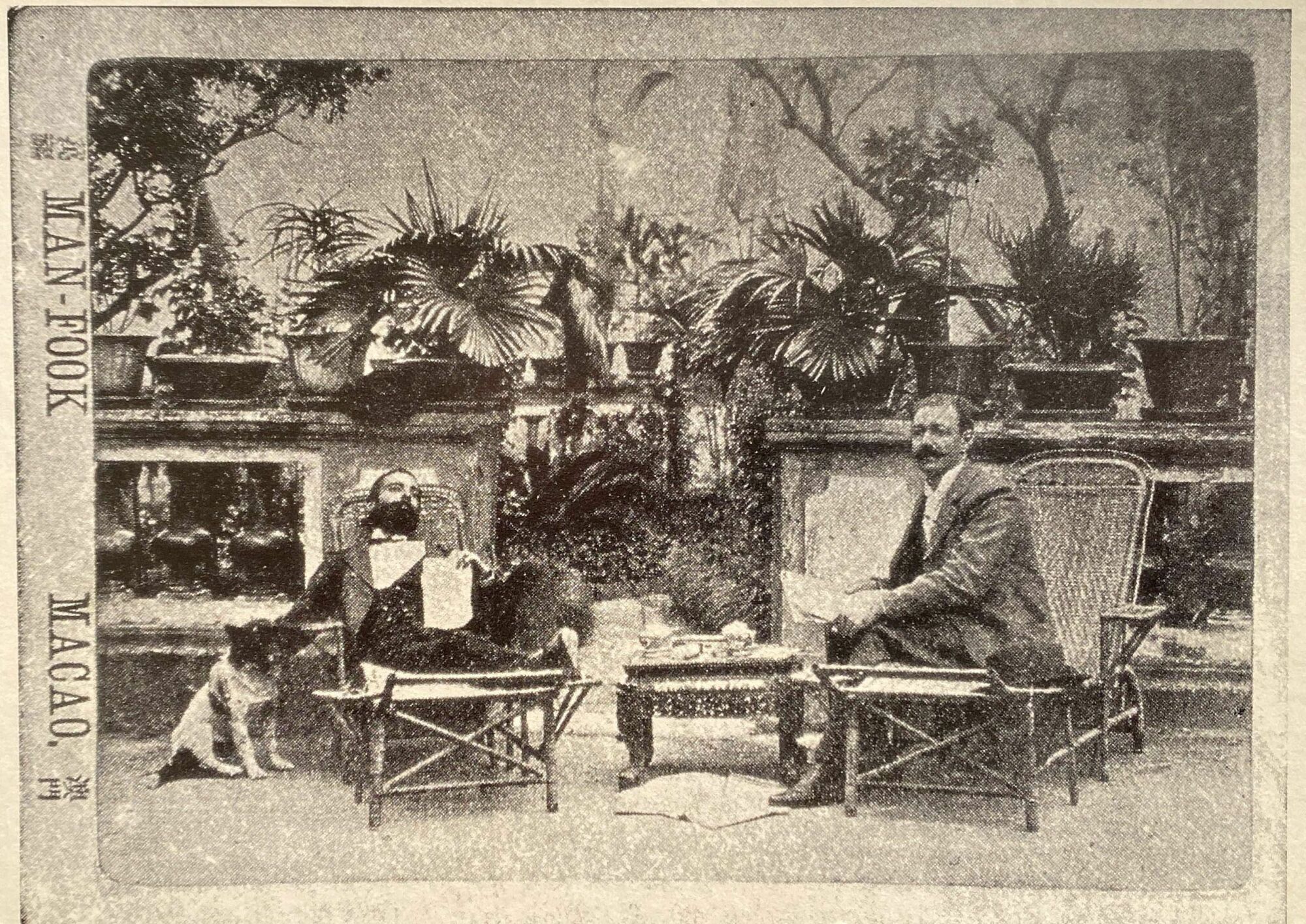
Camilo Pessanha with his friend João Pereira Vasco Source: Instituto Português do Oriente, Macau (1990)
Life Pleasures
Hospedaria (bed and breakfast) Hing-Ki was his first home in Macau, from which he switched to Hotel Boavista, now housing the Portuguese consul’s house, previously named Hotel Bela Vista. In 1896, the writer falls ill and is diagnosed with asthenia, recommended to spend some time in Portugal. A year later, he travels back to Macau via Cadis. Most of his adult life was spent in Macau but he traveled several times to his home country for bureaucratic health matters. In 1902, he’s appointed auditor for the War Council. He also taught Economy of Politics and Commercial Law, was a substitute Law judge, presided to numerous committees,
Also read: Bela Vista Hotel: From Lavish Hotel to Wartime Refuge
According to research, the writer married a local Chinese woman, Lei Ngoi Long but also had a longstanding affair with his stepdaughter, Kuok Ngan Yeng–known as the “silver eagle”. The latter is said to have been the love of his life, with whom he kept a relationship till his death. Pessanha had yet another inseparable friend: a tiny dog called Armindo (see photo above).
The union of Lei and Pessanha resulted in the birth of the author’s only known child, João Manuel Pessanha (1898–1941), who also lived in Macau and spent a lot of time in Hong Kong. The writer’s son had a family of his own, hence extending the family’s name through time. Most of his predecessors are now living abroad in Canada and other countries.
Besides women, Macau also granted Camilo Pessanha with good, loyal friends, such as Macau-based Portuguese writer Venceslau de Morais (who also fell in love with Asia, having traveled a lot across China and Japan). Opium consumption was also very popular during the 19th and 20th centuries, something Camilo Pessanha was also very keen on. He’d recite poems and have long talks while smoking opium amongst friends. The writer, professor, and lawyer was also a member of the Masonry, namely in Macau, where he was part of Luís de Camões “shop”–the name given to this organization’s secret clubs. His affiliation to the group was revealed a few years after his death.
Although Camilo Pessanha traveled a lot to Portugal. However, Macau was where he found his resting peace, on March 1, 1926, after several years of suffering from pulmonary tuberculosis. He’s buried at S. Miguel Arcanjo Cemetery (behind Tap Seac Square and close to Albergue SCM) along with some family members. His last known address is 75 Rua da Praia Grande, Macau, probably a few meters away from the Government Headquarters building.
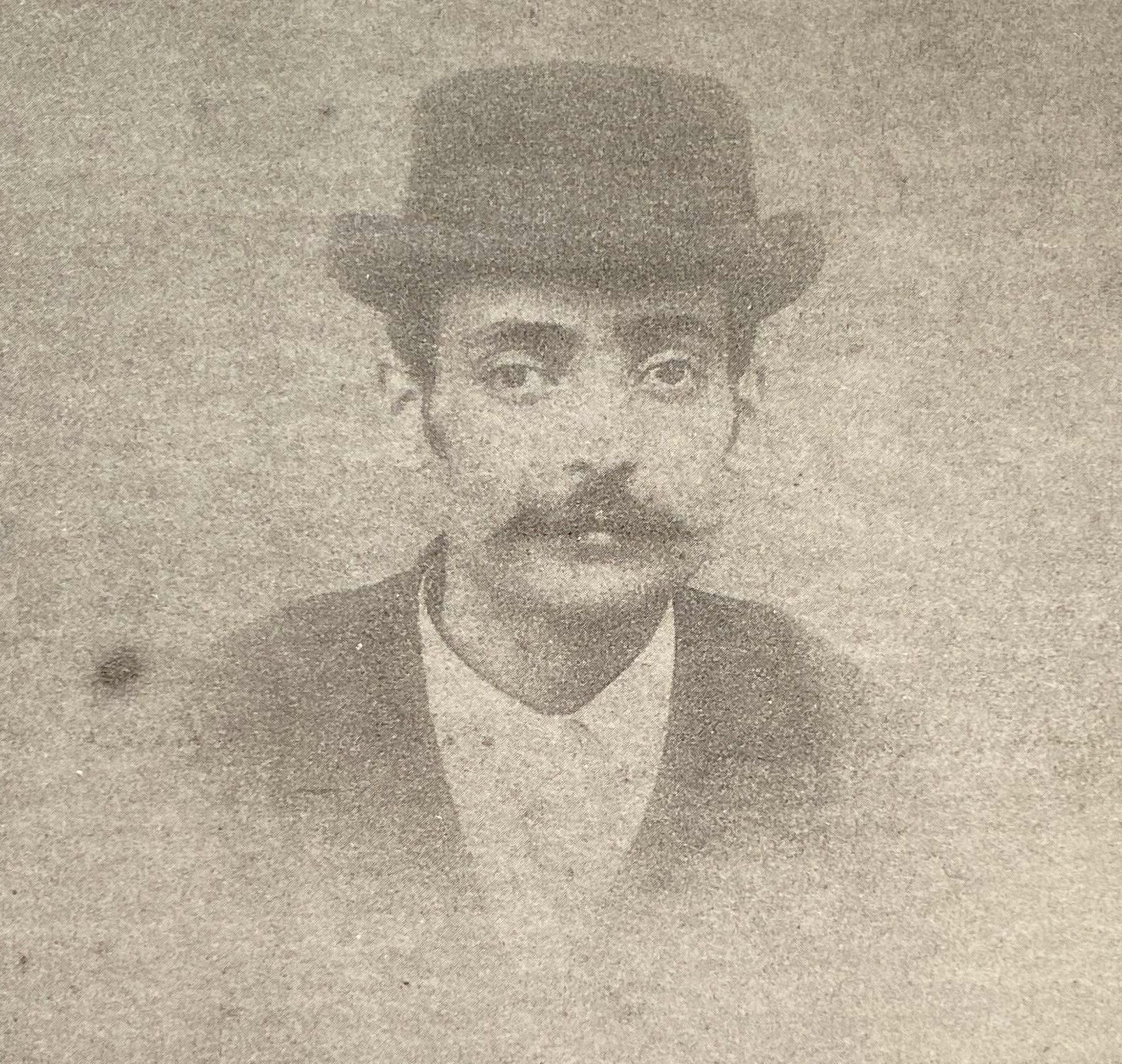
Rare frontal photo of Camilo Pessanha taken in Hong Kong. He preferred profile photos to hide his left lazy eye (circa 1895) Photo credit: Unknown Hong Kong photographer. Source: Instituto Português do Oriente, Macau (1990)

